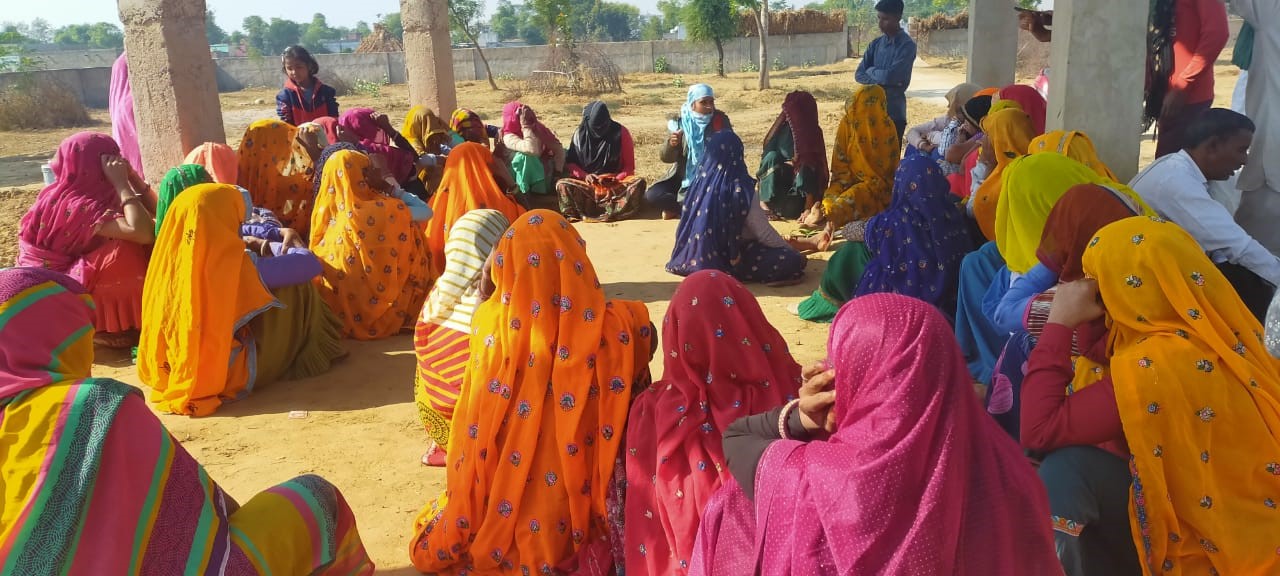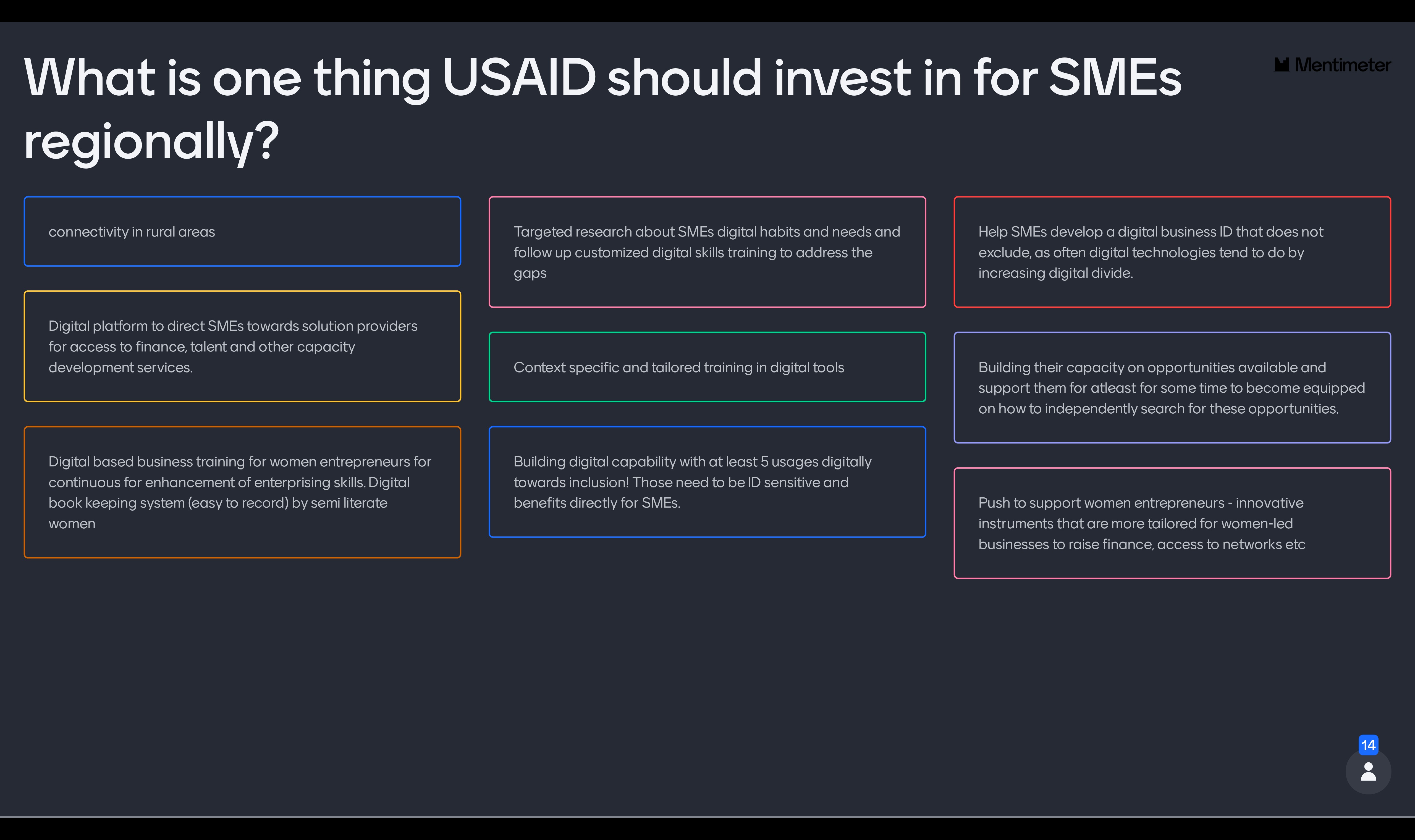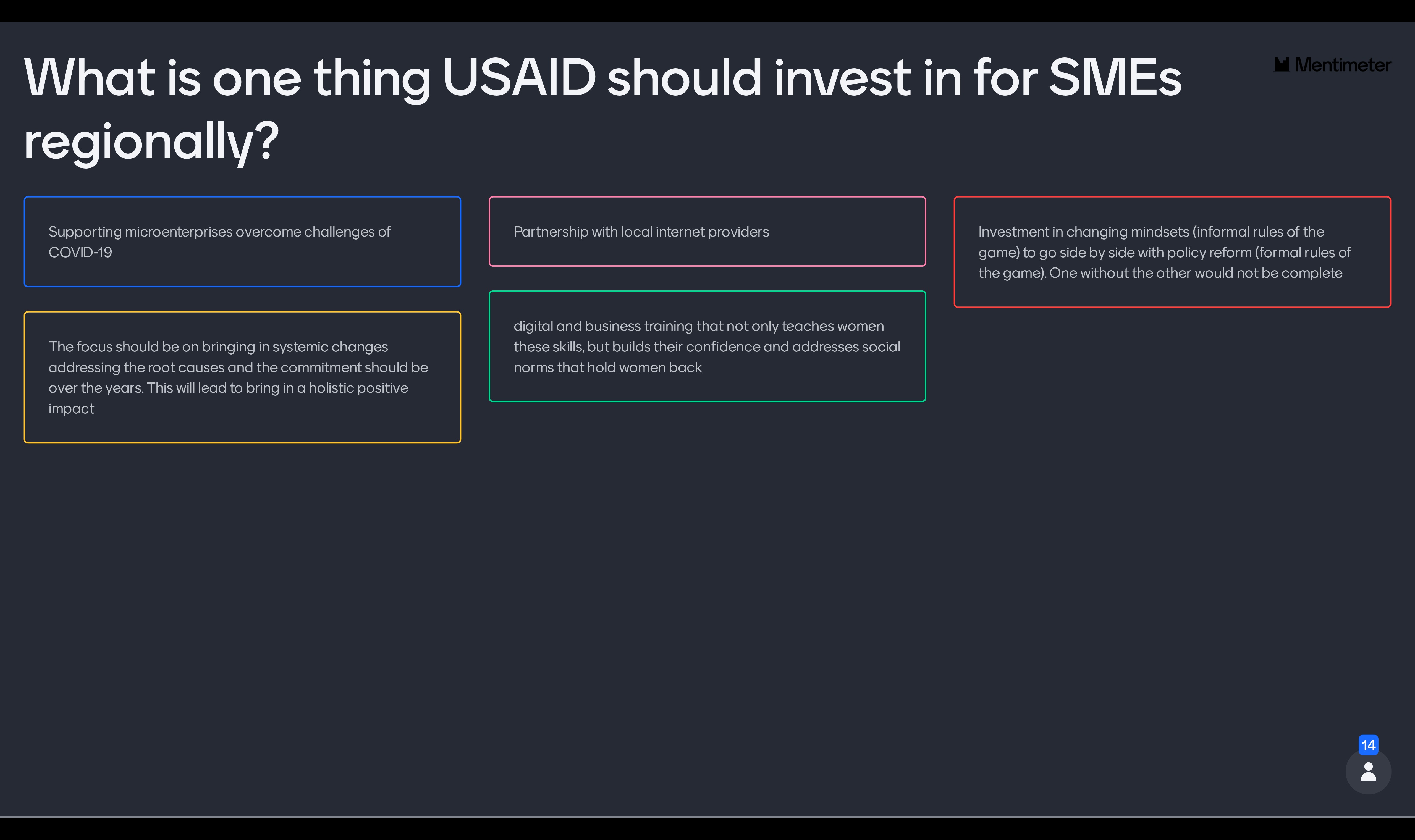Let us know what type of content you'd like to see more of. Fill out our three question survey.
In Case You Missed It: The Digital Journey in South Asia—Opportunities and Challenges for Small Firms and Women Entrepreneurs
May 6, 2021
DAI’s Digital Frontiers Project, in partnership with the U.S. Agency for International Development (USAID)’s Indo-Pacific Office, recently hosted a thought-provoking webinar featuring views from the field in Bangladesh, India, and Nepal on opportunities and challenges for small and medium-sized enterprises (SMEs) and women entrepreneurs in South Asia. Our panel brought together diverse perspectives from experts in government, private sector, and civil society to discuss the key problems faced by SMEs in South Asia today and what the development community can do to break down barriers and help women entrepreneurs take their place as major players in the economy. Missed the discussion? Read the highlights below:

Photo Credit: Digital Empowerment Foundation.
COVID-19 Has Dramatically and Disproportionally Impacted Women Entrepreneurs
“UN Women estimates that at least 47 million women will have fallen below the poverty line due to the pandemic by 2021.”—Keyzom Ngodup, Better Than Cash Alliance, United Nations Capital Development Fund
“In 2020, 53 percent of women have seen a reduction in paid working hours compared to men.”—Anir Chowdhury, Access to Information Programme
There is an increasing reliance on digital services due to lockdowns and travel restrictions that prevent people from going to physical offices, banks, and other services that are crucial for their businesses. Many women entrepreneurs do not have the digital skills or access to mobile and internet services to operate in this new environment. This dependency on digital technology due to COVID-19 presents a challenge in the need for stronger support for these entrepreneurs who are struggling to adjust to a new environment. However, the situation also presents an opportunity as governments, the private sector, and civil society become laser-focused on efforts to address digital inclusion, access, and bridging the existing digital gender divide in the region.
Women Face Barriers in Accessing Credit
“Female entrepreneurs often need to be guaranteed by their husbands or by their fathers, in terms of collateral (in the region).”—Chowdhury
“Too many women lack access to formal identification so they’re unable to open a bank account, own property or develop credit history—which are essential to save, to build assets, secure a loan, and open or expand their business.”—Ngodup
“We need to address some of the cultural barriers that have historically made it quite difficult for women entrepreneurs to succeed.”—Alison Eskesen, Vice President Asia, Mastercard Centre for Inclusive Growth
In many South Asian countries, women’s rights are not protected under the law and it is difficult for women to open bank accounts or get access to loans and credit. Many women lack access to formal education, don’t have the digital financial skills to take advantage of opportunities to obtain credit, and lack the necessary business identification required for things like securing company registration. The expansion of digital tools and businesses may further widen the gender divide unless we address the barriers to women being able to fully participate in the digital economy.
Invest in Upskilling Women Entrepreneurs
Through surveying their members in 20 states, the India SME Forum found that “87 percent of women entrepreneurs survey respondents said they needed training in e-commerce, and digital tools, and technologies so that they can scale up their business.”—Vinod Kumar, President, India SME Forum
“Unless you include digital in life, you cannot really use it only for business. You need to bring it into your life in a way that it helps you to capacitate, to do transactions, do payments, look for jobs, and look for work. Daily efficiencies—that’s very important. And that can come through education, through business, or through capacity building.”—Osama Manzar, Digital Empowerment Foundation
Without digital literacy skills, digital financial skills, knowledge of online platforms and cybersecurity literacy, it is impossible for women entrepreneurs to successfully and safely navigate businesses moving online. Several panellists referenced their organization’s efforts to upskill SMEs and women entrepreneurs including the South Asia Regional Digital Initiative (SARDI), the India SME Forum’s Empowering Women initiative and several activities through Mastercard’s Centre for Inclusive Growth including the Digital Frontiers-implemented Project Women Kirana. Investing in women’s skills leads to greater impact on families and communities and is key to breaking down institutional barriers faced by SMEs and women entrepreneurs.
Participants saw digital platforms tailored to women’s needs, digital skills training, and social norms change as key to future investment opportunities in women-led SMEs. We crowdsourced information from participants for their suggestions on what USAID should invest in for SMEs regionally. Here are some of their responses:


How is Digital Frontiers Supporting Women-led SMEs in the Region?
SARDI is working to improve digital connectivity in South Asia, strengthen the private sector and civil society’s digital capacity, and improve its ability to engage in ICT policy issues. In collaboration with the Digital Empowerment Foundation, SARDI is working with women micro-entrepreneurs, community development organizations, and self-help groups in rural India to digitally upskill them on the use of mobile technologies to manage their businesses, online transactions and equip them to earn their livelihood by leveraging digital/e-commerce platforms.
SARDI also works with women entrepreneurs in urban and semiurban areas to help them translate “digital policies into action” and introduce digital tools and technologies in their businesses to operate and expand their businesses more effectively and efficiently. Through a last-mile connectivity program, SARDI aligns with the Government of India’s PM_WANI program to empower women entrepreneurs who act as public data officers and provide internet access services to local communities in a self-sustaining model.
SMEs, particularly women-owned SMEs, contribute significantly to employment in many South Asian countries, and addressing these gaps is critical to the future economic success of the region. Learn more about SARDI and how it is breaking down these barriers to help SMEs and women entrepreneurs take advantage of the unprecedented opportunities of an increasingly digitalized world.
Digital Frontiers is a $74.4 million buy-in mechanism available to USAID Bureaus and Missions from 2017-2022. DAI implements the Digital Frontiers project, which works closely with USAID Missions and Bureaus, the private sector, and international and local development organizations to identify successful and sustainable digital development approaches and scale their impact globally.